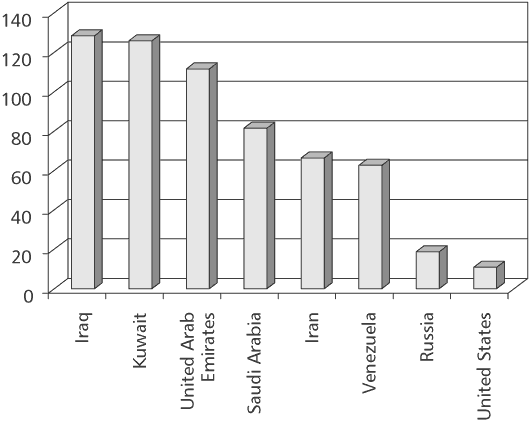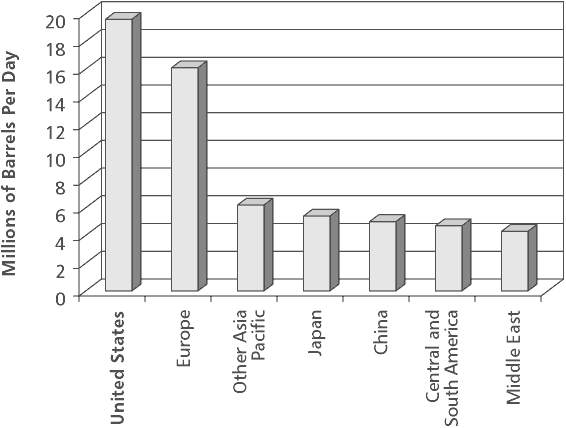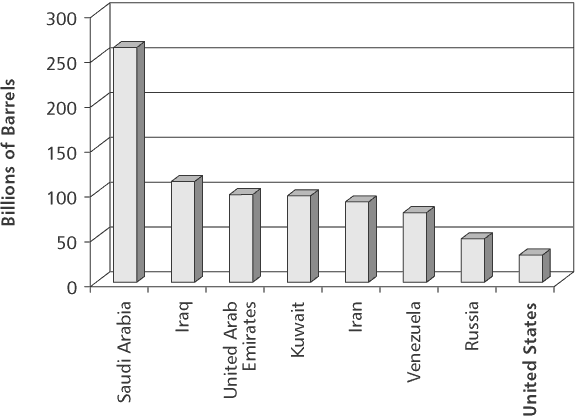Before U.S. forces invaded Iraq, the United Nations inspection team that had been searching the country for weapons of mass destruction was unable to find either such weapons or a capacity to produce them in the near future. As of mid-April, while the U.S. military is apparently wrapping up its invasion, it too has not found the alleged weapons. The U.S. government continues to claim that weapons of mass destruction exist in Iraq but provides scant evidence to substantiate its claim.
While weapons of mass destruction are hard to find in Iraq, there is one thing that is relatively easy to find: oil. Lots of oil. With 112.5 billion barrels of proven reserves, Iraq has greater stores of oil than any country except Saudi Arabia. This combination--lots of oil and no weapons of mass destruction--begs the question: Is it oil and not weapons of mass destruction that motivates the U.S. government's aggressive policy towards Iraq?
The U.S. "Need" for Oil?
Much of the discussion of the United States, oil, and Iraq focuses on the U.S. economy's overall dependence on oil. We are a country highly dependent on oil, consuming far more than we produce. We have a small share, about 3%, of the world's total proven oil reserves. By depleting our reserves at a much higher rate than most other countries, the United States accounts for about 10% of world production. But, by importing from the rest of the world, we can consume oil at a still higher rate: U.S. oil consumption is over 25% of the world's total. (See the accompanying figures for these and related data.) Thus, the United States relies on the rest of the world's oil in order to keep its economy running--or at least running in its present oil-dependent form. Moreover, for the United States to operate as it does and maintain current standards of living, we need access to oil at low prices. Otherwise we would have to turn over a large share of U.S. GDP as payment to those who supply us with oil.
Iraq could present the United States with supply problems. With a hostile government in Baghdad, the likelihood that the United States would be subject to some sort of boycott as in the early 1970s is greater than otherwise. Likewise, a government in Baghdad that does not cooperate with Washington could be a catalyst to a reinvigoration of the Organization of Petroleum Exporting Countries (OPEC) and the result could be higher oil prices.
Such threats, however, while real, are not as great as they might first appear. Boycotts are hard to maintain. The sellers of oil need to sell as much as the buyers need to buy; oil exporters depend on the U.S. market, just as U.S. consumers depend on those exporters. (An illustration of this mutual dependence is provided by the continuing oil trade between Iraq and the United States in recent years. During 2001, while the two countries were in a virtual state of war, the United States bought 284 million barrels of oil from Iraq, about 7% of U.S. imports and almost a third of Iraq's exports.) Also, U.S. oil imports come from diverse sources, with less than half from OPEC countries and less than one-quarter from Persian Gulf nations.
Most important, ever since the initial surge of OPEC in the 1970s, the organization has followed a policy of price restraint. While price restraint may in part be a strategy of political cooperation, resulting from the close U.S.-Saudi relationship in particular, it is also a policy adopted because high prices are counter-productive for OPEC itself; high prices lead consumers to switch sources of supply and conserve energy, undercutting the longer term profits for the oil suppliers. Furthermore, a sudden rise in prices can lead to general economic disruption, which is no more desirable for the oil exporters than for the oil importers. To be sure, the United States would prefer to have cooperative governments in oil producing countries, but the specter of another boycott as in the 1970s or somewhat higher prices for oil hardly provides a rationale, let alone a justification, for war.
The Profits Problem
There is, however, also the importance of oil in the profits of large U.S. firms: the oil companies themselves (with ExxonMobil at the head of the list) but also the numerous drilling, shipping, refining, and marketing firms that make up the rest of the oil industry. Perhaps the most famous of this latter group, because former CEO Dick Cheney is now vice president, is the Halliburton Company, which supplies a wide range of equipment and engineering services to the industry. Even while many governments--Saudi Arabia, Kuwait, and Venezuela, for example--have taken ownership of their countries' oil reserves, these companies have been able to maintain their profits because of their decisive roles at each stage in the long sequence from exploration through drilling to refining and marketing. Ultimately, however, as with any resource-based industry, the monopolistic position--and thus the large profits--of the firms that dominate the oil industry depends on their access to the supply of the resource. Their access, in turn, depends on the relations they are able to establish with the governments of oil-producing countries.
From the perspective of the major U.S. oil companies, a hostile Iraqi government presents a clear set of problems. To begin with, there is the obvious: because Iraq has a lot of oil, access to that oil would represent an important profit-making opportunity. What's more, Iraqi oil can be easily extracted and thus produced at very low cost. With all oil selling at the same price on the world market, Iraqi oil thus presents opportunities for especially large profits per unit of production. According to the Guardian newspaper (London), Iraqi oil could cost as little as 97 cents a barrel to produce, compared to the UK's North Sea oil produced at $3 to $4 per barrel. As one oil executive told the Guardian last November, "Ninety cents a barrel for oil that sells for $30--that's the kind of business anyone would want to be in. A 97% profit margin--you can live with that." The Guardian continues: "The stakes are high. Iraq could be producing 8 million barrels a day within the decade. The math is impressive--8 million times 365 at $30 per barrel or $87.5 billion a year. Any share would be worth fighting for." The question for the oil companies is: what share will they be able to claim and what share will be claimed by the Iraqi government? The split would undoubtedly be more favorable for the oil companies with a compliant U.S.-installed government in Baghdad.
Furthermore, the conflict is not simply one between the private oil companies and the government of Iraq. The U.S.-based firms and their British (and British-Dutch) allies are vying with French, Russian, and Chinese firms for access to Iraqi oil. During recent years, firms from these other nations signed oil exploration and development contracts with the Hussein government in Iraq, and, if there were no "regime change," they would preempt the operations of the U.S. and British firms in that country. If, however, the U.S. government succeeds in replacing the government of Saddam Hussein with its preferred allies in the Iraqi opposition, the outlook will change dramatically. According to Ahmed Chalabi, head of the Iraqi National Congress and a figure in the Iraqi opposition who seems to be currently favored by Washington, "The future democratic government in Iraq will be grateful to the United States for helping the Iraqi people liberate themselves and getting rid of Saddam... American companies, we expect, will play an important and leading role in the future oil situation." (In recent years, U.S. firms have not been fully frozen out of the oil business in Iraq. For example, according to a June 2001 report in the Washington Post, while Vice President Cheney was CEO at Halliburton Company during the late 1990s, the firm operated through subsidiaries to sell some $73 million of oil production equipment and spare parts to Iraq.)
The rivalry with French, Russian and Chinese oil companies is in part driven by the direct prize of the profits to be obtained from Iraqi operations. In addition, in order to maintain their dominant positions in the world oil industry, it is important for the U.S. and British-based firms to deprive their rivals of the growth potential that access to Iraq would afford. In any monopolistic industry, leading firms need to deny their potential competitors market position and control of new sources of supply; otherwise, those competitors will be in a better position to challenge the leaders. The British Guardian reports that the Hussein government is "believed to have offered the French company TotalFinaElf exclusive rights to the largest of Iraq's oil fields, the Majoon, which would more than double the company's entire output at a single stroke." Such a development would catapult TotalFinaElf from the second ranks into the first ranks of the major oil firms. The basic structure of the world oil industry would not change, but the sharing of power and profits among the leaders would be altered. Thus for ExxonMobil, Chevron, Shell and the other traditional "majors" in the industry, access to Iraq is a defensive as well as an offensive goal. ("Regime change" in Iraq will not necessarily provide the legal basis for cancellation of contracts signed between the Hussein regime and various oil companies. International law would not allow a new regime simply to turn things over to the U.S. oil companies. "Should 'regime change' happen, one thing is guaranteed," according to the Guardian, "shortly afterwards there will be the mother of all legal battles.")
Years of Reserves at Current Annual Production Rates*

*The number of years it would take to use up existing reserves at current production rate. Past experience, however, suggests that more reserves will be found. In the 1980s, the world's proven reserves expanded by 47%, even as the consumption continued apace. With a more rapid rate of economic growth in the 1990s, and thus with the more rapid rate of oil consumption, the world's reserves rose by almost 5%.
Source: BP Statistical Review of World Energy 2002
Oil companies are big and powerful. The biggest, ExxonMobil, had 2002 profits of $15 billion, more than any other corporation, in the United States or in the world. Chevron-Texaco came in with $3.3 billion in 2002 profits, and Phillips-Tosco garnered $1.7 billion. British Petroleum-Amoco-Arco pulled in $8 billion, while Royal Dutch/Shell Group registered almost $11 billion. Firms of this magnitude have a large role affecting the policies of their governments, and, for that matter, the governments of many other countries.
With the ascendancy of the Bush-Cheney team to the White House in 2000, perhaps the relationship between oil and the government became more personal, but it was not new. Big oil has been important in shaping U.S. foreign policy since the end of the 19th century (to say nothing of its role in shaping other policy realms, particularly environmental regulation). From 1914, when the Marines landed at Mexico's Tampico Bay to protect U.S. oil interests, to the CIA-engineered overthrow of the Mosadegh government in Iran in 1953, to the close relationship with the oppressive Saudi monarchy through the past 70 years, oil and the interests of the oil companies have been central factors in U.S. foreign policy. Iraq today is one more chapter in a long story.
The Larger Issue
Yet in Iraq today, as in many other instances of the U.S. government's international actions, oil is not the whole story. The international policies of the U.S. government are certainly shaped in significant part by the interests of U.S.-based firms, but not only the oil companies. ExxonMobil may have had the largest 2002 profits, but there are many additional large U.S. firms with international interests: Citibank and the other huge financial firms; IBM, Microsoft, and other information technology companies; General Motors and Ford; Merck, Pfizer and the other pharmaceutical corporations; large retailers like MacDonald's and Wal-Mart (and many more) depend on access to foreign markets and foreign sources of supply for large shares of their sales and profits.
The U.S. government (like other governments) has long defined its role in international affairs as protecting the interests of its nationals, and by far the largest interests of U.S. nationals abroad are the interests of these large U.S. companies. The day-to-day activities of U.S. embassies and consular offices around the world are dominated by efforts to further the interests of particular U.S. firms--for example, helping the firms establish local markets, negotiate a country's regulations, or develop relations with local businesses. When the issue is large, such as when governments in low-income countries have attempted to assure the availability of HIV-AIDS drugs in spite of patents held by U.S. firms, Washington steps directly into the fray. On the broadest level, the U.S. government tries to shape the rules and institutions of the world economy in ways that work well for U.S. firms. These rules are summed up under the heading of "free trade," which in practice means free access of U.S. firms to the markets and resources of the rest of the world.
Oil Consumption 2001

Source: BP Statistical Review of World Energy 2002
In normal times, Washington uses diplomacy and institutions like the International Monetary Fund, the World Bank, and the World Trade Organization to shape the rules of the world economy. But times are not always "normal." When governments have attempted to remove their economies from the open system and break with the "rules of the game," the U.S. government has responded with overt or covert military interventions. Latin America has had a long history of such interventions, where Guatemala (1954), Cuba (1961), Chile (1973) and Nicaragua (1980s) provide fairly recent examples. The Middle East also provides several illustrations of this approach to foreign affairs, with U.S. interventions in Iran (1953), Lebanon (1958), Libya (1981), and now Iraq. These interventions are generally presented as efforts to preserve freedom and democracy, but, if freedom and democracy were actually the goals of U.S. interventions the record would be very different; both the Saudi monarchy and the Shah of Iran, in an earlier era, would then have been high on the U.S. hit list. (Also, as with maintaining the source of supply of oil, the U.S. government did not intervene in Guatemala in 1954 to maintain our supply of bananas; the profits of the United Fruit Company, however, did provide a powerful causal factor.)
The rhetorical rationale of U.S. foreign policy has seen many alterations and adjustments over the last century: at the end of the 19th century, U.S. officials spoke of the need to spread Christianity; Woodrow Wilson defined the mission as keeping the world safe for democracy; for most of the latter half of the 20th century, the fight against Communism was the paramount rationale; for a fleeting moment during the Carter administration, the protection of human rights entered the government's vocabulary; in recent years we have seen the war against drugs; and now we have the current administration's war against terrorism.
Proven Oil Reserves 2001

Source: BP Statistical Review of World Energy 2002
What distinguishes the current administration in Washington is neither its approach toward foreign affairs and U.S. business interests in general nor its policy in the Middle East and oil interests in particular. Even its rhetoric builds on well established traditions, albeit with new twists. What does distinguish the Bush administration is the clarity and aggressiveness with which it has put forth its goal of maintaining U.S. domination internationally. The "Bush Doctrine" that the administration has articulated claims legitimacy for pre-emptive action against those who might threaten U.S. interests, and it is clear from the statement of that doctrine in last September's issuance of The National Security Strategy of the United States of America that "U.S. interests" includes economic interests.
The economic story is never the whole story, and oil is never the whole economic story. In the particular application of U.S. power, numerous strategic and political considerations come into play. With the application of the Bush Doctrine in the case of Iraq, the especially heinous character of the Hussein regime is certainly a factor, as is the regime's history of conflict with other nations of the region (at times with U.S. support) and its apparent efforts at developing nuclear, chemical, and biological weapons; certainly the weakness of the Iraqi military also affects the U.S. government's willingness to go to war. Yet, as September's Security Strategy document makes clear, the U.S. government is concerned with domination and a major factor driving that goal of domination is economic. In the Middle East, Iraq and elsewhere, oil--or, more precisely, the profit from oil--looms large in the picture.
